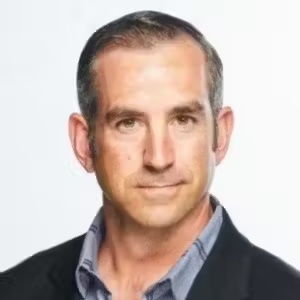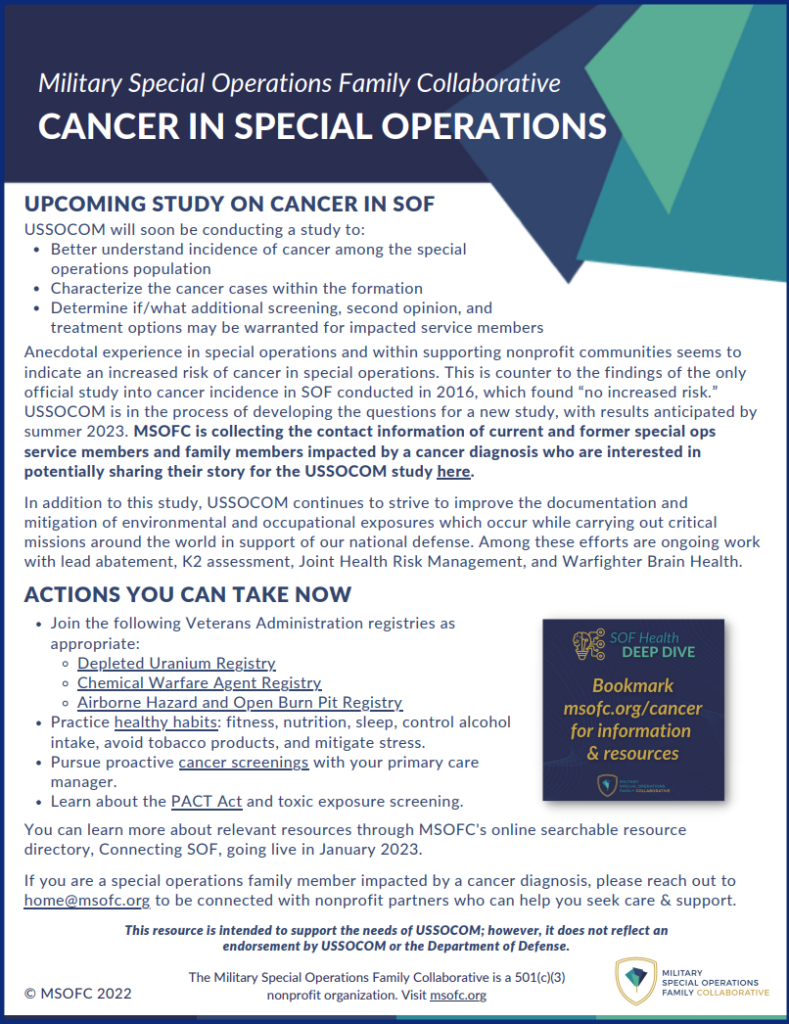
SOF Health Deep Dive: Cancer in SOF
On December 19th, 2022, we hosted a live Q&A with several experts (jump to experts) leading the way to understand cancer trends in the special operations community – several of whom are cancer survivors themselves. We heard from a SOF spouse who shared her moving story about losing her husband to cancer, and also spoke to the culture shift needed in SOF to eliminate the stigma of seeking care. Another common theme was the difficulty of reaching the veteran population with up-to-date information on SOF-specific risk factors and exposures, recommended screenings, and treatment options. To that end, please share this page widely with any special ops service members, veterans, family members, and providers in your networks to help us get the information and resources (jump to resources) to everyone who may be affected by cancer.
Cancer is a devastating diagnosis, but with early detection and quality care – there is hope.
As mentioned during the event, MSOFC is collecting the contact information (link) of current and former special ops service members and family members impacted by a cancer diagnosis who are interested in potentially sharing their story for the U.S. Special Operations Command study.
And if you attended the live event, or watched the recording, please share your feedback (here) so we can continue to improve these events in the future. Thank you!
Deep Dive Replay
The MSOFC team pulled out some key take-aways by the minute to highlight questions frequently asked. You can easily jump to these spots by clicking on the timestamp in the YouTube video description.
- 00:07:30 Introduction
- 00:03:47 War is Toxic
- 00:12:30 Common Exposures in SOF
- 00:33:00 Lifestyle & Nutrition Protective Factors
- 00:36:36 Documenting Exposures on Active Duty
- 00:40:52 State of the Research on Cancer in the Military
- 00:45:34 Upcoming Navy SEAL Foundation Survey
- 00:47:26 Common Cancers in Military Population
- 00:54:05 Upcoming SOCOM Cancer Study
- 00:58:05 Development of SOF Cancer Screening Protocol
- 01:02:30 Blood Biomarker Screening Uses & Limitations
- 01:08:13 Genomic Testing for Targeted Therapies
- 01:18:26 Family Support in Seeking Screening & Care
- 01L23:21 Nurse Case Management in Cancer Care
- 01:26:53 Vanessa’s Story as Surviving Spouse
- 01:32:23 Peer-to-Peer Health Coaching
- 01:38:14 Reaching SOF from Qualification to Post-Service
- 01:48:23 Survivorship – Life After Cancer
- 01:58:00 Closing Comments
Deep Dive Expert Speakers

Medical Director of Soteria Precision Medicine Foundation

The University of Texas MD Anderson Cancer Center

Army Family Physician

Clinical Nurse Researcher
Co-Founder of HunterSeven Foundation

Director of TFDSOF Health Initiatives Program

MSOFC Cancer Task Force Chair
Former Navy SEAL
Resources on Cancer in SOF
Helpful Websites and Articles
- HunterSeven Foundation: Research, Education, and Immediate Needs
- Soteria Precision Medicine Foundation Services
- Veterans, Military Service, and Cancer Risk. By Christina Bach, MBE, LCSW, OSW-C, FAOSW. “There are approximately 50,000 new cancer cases in Veterans reported annually. As the Veteran population continues to age, this number will continue to rise. This is an unexpected risk of military service. A service member likely doesn’t think about his or her risk of developing life-threatening cancer, 20 years later, as a result of exposure to chemicals or radiation.”
Fact Sheets and Printables

- MSOFC Fact Sheet: Cancer in Special Operations
- HunterSeven Foundation Fact Sheet: VA Caregiver Program
- HunterSeven Foundation Resource: SOF Transition Chart
- HunterSeven Foundation Resource: Cancer Screening Chart
- HunterSeven Foundation Fact Sheet: Galleri x HunterSeven Early Detection Blood Test
Research & Academic Papers
- Slow Burns: A Qualitative Study of Burn Pit and Toxic Exposures Among Military Veterans Serving in Afghanistan, Iraq and Throughout the Middle East. “During deployment to the Persian Gulf War and Southwest Asia theatre of operations, Veterans often experienced various hazards, foremost being open-air burn pits and oil well fires. While over 23 presumptive conditions (ranging from brain cancer, interstitial lung disease, and lymphomas to sleep/mood disorders, depression, and cognitive impairment) have been studied in connection with their military-related exposures, there is a paucity of qualitative research on this topic. This is especially true in the context of explanatory models and health belief systems, vis-à-vis underlying social and cultural factors. The current paper provides a balanced conceptual framework (summarizing causal virtues and shortcomings) about the challenges that Veterans encounter when seeking medical care, screening assessments and subsequent treatments.”
- A Pilot Study of Airborne Hazards and Other Toxic Exposures in Iraq War Veterans. “During their deployment to Iraq in support of Operation Iraqi Freedom (OIF), many Veterans were exposed to a wide array of toxic substances and psychologic stressors, most notably airborne/environmental pollutants from open burn pits. Service members do not deploy whilst unhealthy, but often they return with a multitude of acute and chronic symptoms, some of which only begin to manifest years after their deployment. Our findings, while preliminary in nature, suggest that Iraq War Veterans who participated in our survey reported a decrease in overall physical fitness and increased respiratory clinical symptoms compared with pre-deployment periods. The objective of this report is to provide information that will benefit how combat Veterans are cared for post-deployment. Strategies for a wider and more comprehensive assessment and medical screening process post-deployment are recommended.”
If you missed the November Team Room you can watch the replays at the Global SOF Foundation website. And check out other virtual SOF health events by subscribing to MSOFC’s YouTube channel.


